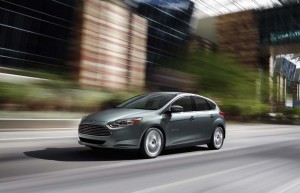Ford Motor Co. becomes the latest automaker to slash pricing to try to boost sales of its slow-selling battery-car, the 2014 Focus Electric.
Sales of both battery-electric vehicles, or BEVs, and plug-in hybrids have generally lagged proponents’ expectations prompting makers to drop base prices or increase incentives in the hope of luring more consumers into showrooms.
Among other makers who have cut prices in recent months are Nissan, Chevrolet and Honda. Meanwhile, Toyota is increasing marketing efforts to revive demand for the conventional Prius hybrid after an unexpected sales skid during the first half of the year.
The 2014 Ford Focus Electric will drop by $4,000, bringing its new base price down to $35,200. It will still be eligible for $7,500 in federal tax credits, as well as additional incentives in California and a number of other states. Nonetheless, the battery-powered version of the Focus is one of the more expensive offerings in its segment, its base price about $6,000 higher than the Nissan Leaf.
That Japanese battery car is currently the most popular all-electric model in the mainstream market, with sales of 9,839 during the first half of this year. Significantly, that’s more than the 9,819 Leaf battery-cars Nissan sold during all of 2012.
(Infiniti indefinitely delays launch of LE luxury electric vehicle. Click Here for more.)
Several factors appear to be at work in the Japanese maker’s favor. For one thing, it switched from Japanese to U.S. production earlier this year, a new assembly line opening in Smyrna, Tennessee just around the corner from an all-new Nissan battery plant.
The maker insists that the move – along with improvements in manufacturing – helped justify the decision to introduce a new, stripped-down model that, at $28,800 is 18% less expensive than the old base Leaf. Higher end models also got a smaller price cut – along with improved cargo space and, on the top-line Leaf, a new, higher-speed charger.
Honda, meanwhile, cut by roughly a third, or $130 a month, the monthly lease price for its new Fit EV subcompact battery-electric model. And customers will now be allowed unlimited mileage, though battery car owners typically clock significantly lower mileage than when driving conventional vehicles.
(Mercedes-Benz planning plug-in version of new S-Class. Click Here for the full story.)
General Motors’ plug-in hybrid, the Chevrolet Volt, is now being offered with additional incentives worth as much as $5,000 to keep demand building. That means despite a $39,995 base price, customers in California can get one of the so-called extended-range electric vehicles for as little as $28,495.
That cut also appears to be working and for the first time this year, sales of the Volt are running ahead of the Nissan Leaf, albeit by a modest 16 units for the first half of 2013, 9,855 to 9,839. The Chevy Volt is still running well behind its original sales goals, though. The maker hasn’t given out a hard number for 2013 but last year it came in at barely a third of a target of around 45,000 in the U.S. market.
Ford sold only 900 of the Focus Electric models during the first half of 2013 after moving a modest 1,593 last year. Demand has been so weak the maker took the unusual step of making no changes to the vehicle for the 2014 model-year.
But battery-car sales, in general, have been lagging well behind expectations, and that has resulted in a series of industry setbacks including the bankruptcy of little Coda and the likely collapse of Fisker, the plug-in hybrid maker that fired most of its staff earlier this year.
Price has generally been considered a serious obstacle to sales of battery-based vehicles, but there are other issues, including limited range and long charging times, as well as moderating U.S. fuel prices that have encouraged a surge in demand for gas-guzzling pickups and other large trucks in recent months.
Even the Toyota Prius, the best-selling conventional hybrid, saw sales dip 5.1% for the first half of 2013.
Along with price cuts, manufacturers have been taking other steps to encourage potential battery-car buyers. Nissan, for example, has offered an expanded warranty on the Leaf’s battery and recently announced it will offer owners the ability to upgrade to newer, more powerful batteries when they become available.
(New Nissan program will let Leaf owners upgrade to newer, more powerful batteries. Click Here.)
Tesla, meanwhile, has added its own “bullet-proof” warranty on the battery in its Model S. The maker is also setting up a nationwide network of high-speed chargers to make it possible to travel long distances with minimal disruptions.
Notably, Tesla is the only battery-car maker to exceed its admittedly modest sales forecast this year. The maker went into the black during the first quarter for the first time since it was founded.
(New super-fast charging system could boost demand for battery vehicles. For more, Click Here.)


Gotta move those batteries to condition consumers to buy these impractical EVs so the auto makers can reduce their fines for not being able to reach the absurd 54.6 mpg CAFE requirements pulled from the arses of Obama and the EPA.